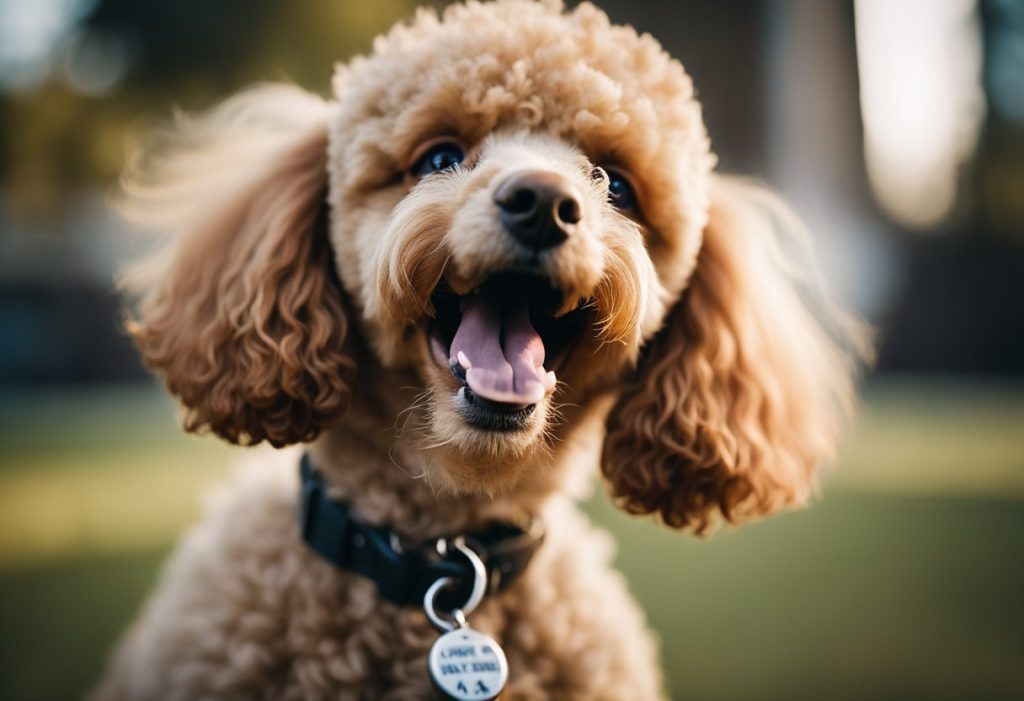A Toy poodle might be biting and growling due to several reasons, including:
- Overstimulation: Puppies can become overstimulated from excessive play or attention, leading to biting as a way to release energy or signal that they need a break.
- Frustration: Puppies may bite out of frustration when they are unable to communicate or get what they want. This can happen when they are trying to play or get a treat but are unable to do so.
- Teething: Teething puppies often bite to relieve discomfort from their sore gums. This is a normal part of development, but it can be frustrating for owners to deal with.
- Fear: Puppies may bite out of fear when they feel threatened or unsafe. This can happen in new situations or when they are around strangers or other animals.
If your toy poodle is biting and growling, it is important to identify the trigger so that you can address it. You can also try the following techniques to discourage biting:
- Yelp when bitten: This will startle your puppy and let them know that they are hurting you.
- Redirect their attention: When your puppy starts to bite, offer them a chew toy or plaything instead.
- Avoid rough play: Roughhousing can reinforce biting behavior, so it is best to avoid it.
- Socialize your puppy: Expose your puppy to different people, animals, and environments in a controlled and positive manner. This will help them learn to interact with the world in a calm and non-aggressive way.
- Enroll in puppy obedience classes: Obedience classes can teach your puppy basic commands and help them learn to control their impulses.
With patience and consistency, you can help your toy poodle overcome their biting tendencies and become a well-adjusted and affectionate companion.
Understanding Puppy Aggression

Puppies learn about the world through their mouths, exploring objects and interacting with their environment through biting and mouthing. This behavior is also a way for them to play and communicate with each other and with their human companions. However, overstimulation, frustration, teething, and fear can trigger aggressive biting behavior in puppies.
In the case of your toy poodle, the sudden onset of aggression could be attributed to several factors. Perhaps she’s feeling overstimulated from excessive play or attention. Puppies have limited attention spans and need regular breaks to rest and recharge. Additionally, teething puppies often bite as a way to relieve discomfort from their sore gums.
Identifying the Triggers
The first step in addressing your puppy’s aggression is to identify the triggers that set off her behavior. Is she more likely to bite when playing rough, when approached unexpectedly, or when feeling overwhelmed? Pay attention to her body language and the situations that precede her biting episodes. This will help you anticipate and avoid potential triggers.
Calming the Biting Frenzy
Once you’ve identified the triggers, you can implement strategies to redirect your puppy’s behavior and discourage biting. When she starts mouthing or biting, let out a sharp yelp, mimicking the sound a hurt puppy would make. This will startle her and interrupt her biting behavior.
Immediately redirect her attention to an appropriate chew toy or plaything. Encourage her to chew on the toy instead of your hands or arms. Positive reinforcement is key. When she chews on the toy appropriately, praise her enthusiastically and offer treats as rewards.
Avoiding Rough Play
While it may seem tempting to engage in rough play with your puppy, this can actually exacerbate her biting behavior.
Puppies don’t understand the difference between playful biting and aggressive biting, and roughhousing can reinforce the notion that biting is acceptable. Instead, opt for gentler forms of play, such as fetch or puzzle toys.
Socialization and Training
Early socialization is crucial for preventing aggression in puppies. Expose your puppy to different people, animals, and environments in a controlled and positive manner.
This will help her learn to interact with the world in a calm and non-aggressive way.
Enrollment in puppy obedience classes is another valuable tool in addressing biting behavior.
These classes provide structured training, teaching your puppy basic commands and reinforcing good manners.
A professional trainer can also help you identify specific triggers and develop customized training strategies.
Patience and Consistency
Remember, changing behavior takes time and consistency. Be patient with your puppy and avoid scolding or punishing her for biting. Instead, focus on positive reinforcement and redirecting her behavior to more acceptable outlets.
With consistent training and patience, you can help your toy poodle overcome her biting tendencies and become a well-behaved companion.
Conclusion
While puppy aggression can be frustrating, it’s important to remember that it’s a normal part of development.
By understanding the triggers, implementing effective training techniques, and practicing patience and consistency, you can help your toy poodle learn to express their emotions in a more appropriate and loving way.
With time and dedication, your puppy will grow into a well-adjusted and affectionate member of your family.
